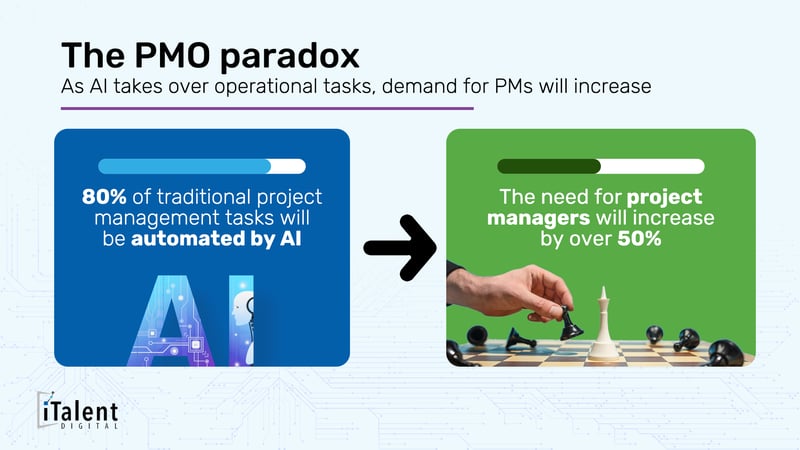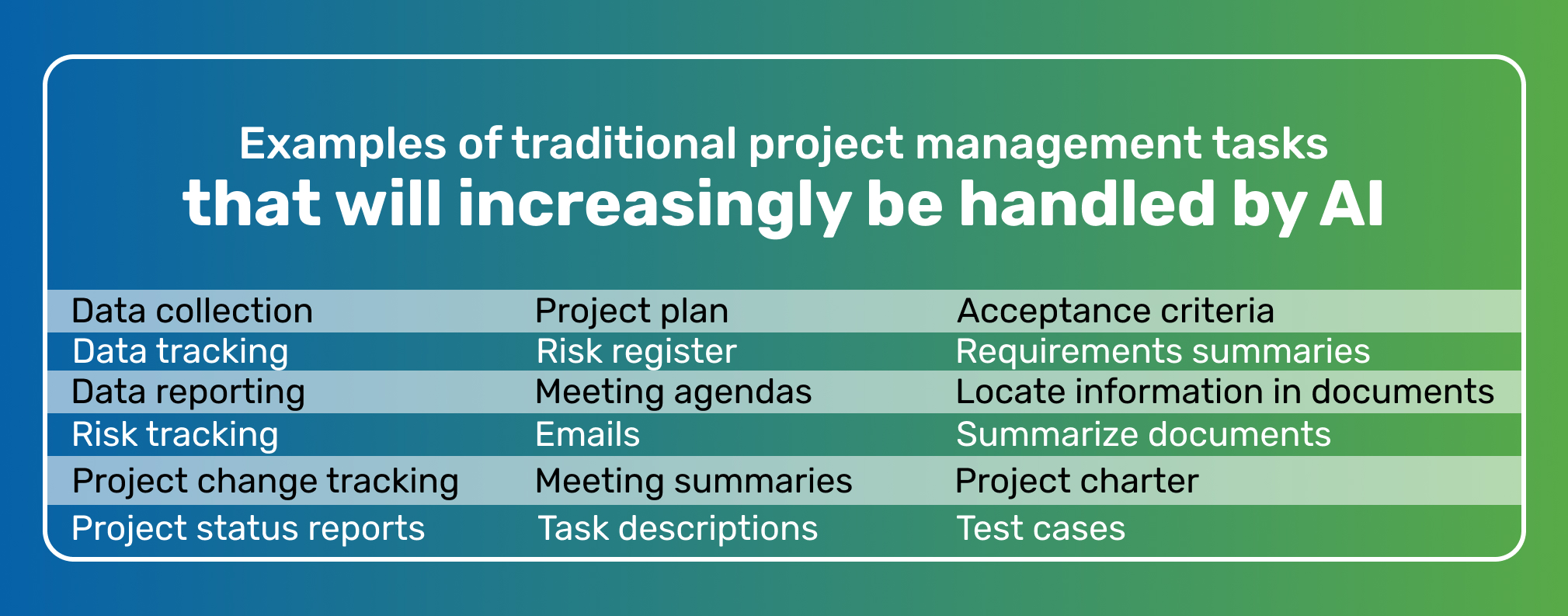Navigating the AI Revolution: the evolving role of project managers

Project management is currently at a significant juncture, marked by a striking paradox. While there's an escalating need for proficient project managers, the advent of artificial intelligence (AI) in this field promises automation of (and relief from) most of their traditional tasks. Such a transition will allow project managers to focus on more strategic and impactful roles.
This scenario is shaping a new dynamic in project management, balancing the increasing demand for human expertise with the growing capabilities of AI technologies. It signifies a shift in the project management paradigm, where AI will be increasingly leveraged to streamline operations.
In this article, I explore how the infusion of AI into project management is transforming the roles and responsibilities of project managers.
The rising tide of AI in project management
Projections indicate that AI could automate up to 80% of tasks traditionally done by project managers by 2030. The essence of this transition lies in enhancing efficiency and decision-making accuracy.
AI's proficiency in handling and interpreting massive data sets, predictive capabilities, and efficiency in managing routine tasks are revolutionizing project management. These advancements represent a significant leap forward by offering a more data-driven, precise, and efficient project management approach.
The growing demand for project managers
Despite the rapid advancements in AI, the demand for skilled project managers is rising. This might seem counterintuitive given that AI is expected to take over the bulk of their tasks, but the increasingly strategic nature of their role will put them in high demand.
The Project Management Institute's (PMI) Talent Gap report estimates that 25 million additional project managers will be needed worldwide by 2030 to keep up with demand. This growth is propelled by expanding global projects and rapid technological advancements.

Modern organizations are looking for professionals adept at managing complex projects and navigating the intricacies of a technology-driven world. This demand highlights a pivotal shift in the skillset required for project managers, emphasizing the importance of a harmonious blend of technical expertise and traditional management skills.
This demand will be compounded by the reality that the average age of project managers in the United States is 46, which means that over the next couple of decades, many of them will start transitioning into retirement. This is expected to create a real gap.
Investment and adoption trends in AI for project management
Enterprises are significantly investing in AI, with large organizations dedicating around $75 million annually to AI projects. This data reflects the depth of commitment from companies to stay ahead in the AI curve.
The IBM Global AI Adoption Index reveals a varied landscape regarding AI adoption among businesses. Approximately 35% of companies have already integrated AI into their operations, while close to 42% are still assessing AI's potential for their business.
The evolution of the project manager’s role
As AI takes on more routine administrative tasks, project managers will focus on areas where they add unique value – strategy, innovation, and leadership. Future project managers will likely spend less time on operational details and more on guiding the strategic direction of projects.
This pivotal shift moves project managers from task-focused to central roles in business innovation and decision-making. Professionals in this role will go beyond overseeing project logistics and actively architect enterprise success.
The strategic importance of PMO in AI-driven project management
The Project Management Office (PMO) is essential to integrating AI and data analytics to provide a comprehensive view of an organization's project portfolio. This holistic approach allows a deeper understanding of how projects impact various stakeholders and the overall business objectives.
This differs from the way projects are typically managed today, which involves a project manager working on one project or a portfolio of projects with little to no visibility into all the other projects in flight in other departments that are impacting the same stakeholders and supporting the same business goals.

With AI capabilities, the PMO can have enterprise-wide views and analyze trends, predict outcomes, and optimize resource allocation across programs and portfolios. Such insights lead to more informed decision-making and ensure that projects are well coordinated and aligned with the organization's strategic goals while at the same time mitigating change fatigue.
AI-powered project management: a new frontier
Project management is advancing into new territories empowered by AI. This transformation is evident in the integration of AI in several vital areas, such as project planning, risk management, and stakeholder communication. AI's predictive analytics and real-time monitoring capabilities set a new project oversight and control standard.
This shift paves the way for project managers to focus on more nuanced, strategic tasks. By leveraging AI, PMOs are now poised to offer comprehensive, holistic oversight, moving beyond isolated project silos to a broader, enterprise-wide perspective.
Preparing for the future: education and skill set
The move toward AI-driven project management calls for a new focus on education and skill set development, particularly for individuals new to the field.
Future project managers must be well-versed in strategic planning, adept in analytics, and literate in AI and related technologies. Emphasizing these areas in professional development programs is crucial.
Focusing on these areas will equip the next wave of project managers with a blend of traditional management skills and technological savvy. This holistic approach will ensure they are well-prepared to navigate and lead within a complex, AI-enriched project landscape.
Case studies and real-world applications
Here at iTalent, we have deployed AI to help our enterprise customers automate a lot of their data gathering, analytics and reporting processes to vastly speed up time to insight.
In one example, Autodesk used ChaMa, iTalent’s AI-enabled change management and project management software to reduce the time it takes them to generate organizational change management reports by 90%.
Another good application of AI is in automating manual processes, as well as the reporting of huge data sets. This results in a massive reduction in person-hours needed to complete these tasks, freeing up highly skilled personnel to perform more strategic work.
Embracing change: How project managers can adapt
For project managers, adapting to the AI-driven landscape is not just beneficial; it's essential. By embracing AI tools, project managers can significantly bolster their strategic capabilities. This adaptation demands a dedication to lifelong learning and a commitment to keeping pace with technological advancements.
Being adaptable and open to new methodologies will be indispensable for project managers who aim to excel in an environment enriched by AI. Navigating this new terrain successfully will require a blend of traditional project management skills and a willingness to innovate and evolve.
Navigate the AI Revolution with iTalent Digital
The integration of AI is reshaping the landscape of project management, steering it towards a future where strategic leadership and innovation take center stage. This evolution is not just a change; it's an opportunity. Project managers now have the chance to redefine their roles and substantially impact their organizations' success.
If you want to enhance your project management strategies with AI, iTalent Digital is here to help. Our innovative PMO services blend AI with agile project management to improve efficiency and strategic decision-making.
Get in touch with us at pmo@italentdigital.com for a personalized discussion about your project management objectives. Together, let's harness the power of AI to elevate your projects to new heights of success!
You may also like:
Change management for project managers: how to ensure better outcomes
PMO, CMO and TMO: what they are and how they drive change agility
Elevate your decision-making with Power BI’s AI capabilities



